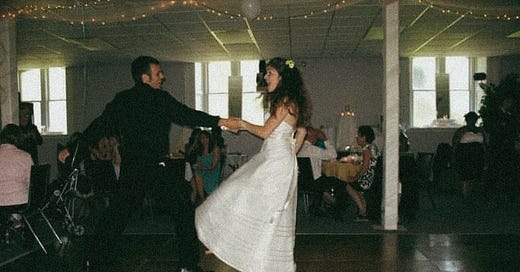Oh hey guys.
I decided to do this portion of the series as a podcast because it feels really personal It is really personal and I thought hearing my voice would make it a little more human for those of you listening because sometimes when I write even though writing is my way of processing it's my way of connection it's the skill that I've developed to communicate but sometimes when I write about things like this it feels like people are consuming it as if I'm an idea or I represent an idea to them and not that I'm a human who has been um you humanly affected by these things. And I'm not sure that this will help. But this is how I wanted to do it. But of course, if you're not a podcast listener, the transcript is below and you can just read it.
You’re going to be listening to this a few days after I record it, but today is the morning after the election and I feel strange today, but I was thinking about all these posts I was seeing on social media leading up to this election. There were a lot of people taking about canceling their husband’s or their wives votes and there was all this conversation around how you can be in a politically divided marriage. I saw one comment on TikTok that said, “if I have to cancel out my husband’s vote then I’m canceling our marriage. Immediate divorce.” And I had to sit with that for a second and think about what that would be like, to be so divided from your spouse that divorce would be the end result of voting differently. Which, of course is not just about the vote, but what the vote represents which is the differences in values and world views. And that much, I understand, but if you’re getting to Election Day and are shocked by your spouses’ vote, I’m more surprised by that, I think.
Which brings me to the discussion I want to have with you today about deconstruction and faith shifts in marriage. I haven’t seen too many talking about the dynamics of this in a marriage. It can be … really really messy.
Imagine you’re building a house. It’s a big, beautiful house, you built it brick by brick, but then one day, you see a crack in the wall and you’re like, hang on. How did that happen? And you start inspecting the walls, the foundation, the roof and you realize that you didn’t even look at a blueprint, you’re not a licensed contractor, you have no idea if the materials you used were good quality and now you’re not sure if this whole thing is gonna collapse on you or not. You ask yourself — is my house even safe?? So you take the whole thing down and leave the good parts, if there are any, and you rebuild it much more carefully and thoughtfully and everyone around you is like “ARE YOU CRAZY?” And you’re like “YES, MAYBE!”
That’s deconstruction in a nutshell, but now picture this same scenario, but you’re living in the house with someone else. They might be perfectly fine in the house. They might think you’re crazy or they might be picking up the spare sledge hammer. There’s no way for you to tear down the dry wall without it affecting their life and their safety.
Zach and I met when we were 19. So, babies. I grew up in a deeply conservative Christian household (my dad is from the midwest, my mom from the south) in a pentecostal denomination. Zach was raised by a single mom in a non-religious household in New England. For a while, I was the only one of my sibling’s to marry into a family that wasn’t Christian. But even though we came into marriage from totally different worldviews and upbringings, a lot of our core beliefs and values were the same, but we were so young that we shaped a lot of what we came to know and believe together. There was so much we hadn’t thought about yet so we influenced each other, taught each other, shared insights and experiences. Our marriage has always felt like a partnership between two independent hyper-individuals in a way that has been edifying and challenging. We learned together we learned apart, we are constantly pushing and pulling and it’s fun for both us. Most of the time.
But because of that, we don’t have the same ideas about a lot of things. Politically, I would say we’re 85% aligned, and we vote the same way, but we have some pretty fun discussions about gun control, immigration, and just the general state of you know … everything. But that’s politics and for me, disagreeing about politics has never felt as high stakes to me as not being on the same page about faith.
We all have a threshold of tolerance when it comes to how much we can concede about faith and politics in a relationship. Nothing will test that threshold of tolerance when it comes to disagreements in marriage. Especially in a moment in our culture where there are so many voices that encourage you to cut people off if your beliefs are no longer compatible. In politics, it’s about how you vote. In Christianity, it’s “light fellowshipping with darkness” and being “unequally yoked.” A lot of people will present this dilemma in really simplistic ways : if they do/vote/believe this, they are bad. If they do/vote/believe that, they are good. And you know, I wish it really was that simple. You know how in Disney movies, at least when we were kids, you knew who the bad guy was? They were drawn in a certain way, or their voices had a sort of nefarious tone to them, or they wore black clothes, or they smirked a lot. You always kind of knew. Until recent movies when we’re like let’s give NO clues that Prince Hans is bad until the last 10 minutes of the movie! But anyway, in real life bad and good are a lot more complicated. Even bad people are capable of good things. Good people are capable of bad things. It’s messy. It’s complex. And It’s not always easy to cut someone off from your life because of how they believe. Especially when the person you disagree with sleeps in your bed every night and is the other half of a legal and spiritual covenant. But we still have a threshold.
What do you do when you’re married to someone and have an entire life and family with someone who used to believe exactly the way you did, but 20 years later, they don’t believe in hell anymore? What if they stop believing the same theory of atonement as you? What if they no longer believe homosexuality is a sin? What if they don’t believe the Bible is the true, inerrant word of God anymore? What if you’re sitting at dinner one night and you realize you don’t even know if your husband believes in God anymore?
The difference between comment sections and dinner tables is that you can’t just say “well you’re wrong and you’re a bad person!” To the person you know more intimately than anyone else on the planet and you know that they are inherently good. You know what kind of parent they are. You know how they treat other people. You know how they act behind the wheel of the car. You know how they speak about people that have treated them poorly. You see the absolute worse and best of them and you know who they are. So you can’t say, “oh if you don’t believe in hell you’re not a Christian” because you see them emulate the character of Christ every single day. When you’re in relationship with someone, and you love them, if you want to stay in relationship with them, if you want to love them, you don’t write them off. You get curious. You ask questions. You want to know how they came to those conclusions.
Well. That was true for us, at least. I know it’s not true for everyone. I consider Zach and I to be very, very lucky. Even though our relationship was formed in bible college, with our faith at the very center of it all, our relationship has never hung on our faith. And I couldn’t have know that unless it was tested. You don’t know how much your relationship depends on sharing the same faith until someone’s faith starts changing. I’m not with Zach because he’s a christian and he’s not with me because I’m Christian. Sure, that was probably the main factor when we got married and neither one of us would have considered marrying someone who wasn’t a Christian, but that’s not why we’re still together. And I want to talk about why that matters.
Zach and I have been deeply entrenched in the deconstruction space for about 8 years now because of our ministry to people who have experienced church hurt, spiritual abuse, and trauma. We started as just being a part of that space because of our own wounds and over time became leaders, mentors, and counselors. Our work happens largely offline and although my work online is a channel for it, I don’t speak publicly about the things that I do offline. It’s very private and for the people that I talk to and walk with, it’s very fragile. Their stories are their own and I would never ever break that trust. But what I can tell you is that deconstruction in a Christian marriage tends to exist in extremes. It’s either a good experience that strengthens your marriage or it brings unthinkable pain and harm into it. Reevaluating your faith is never a neutral thing. It fundamentally changes the way you engage with the world. And that fundamentally changes your relationship. And when one person goes beyond the other person’s threshold of tolerance, it’s hard to find a way forward.
For Zach and I, we have not always been on the same page, but we have always moved forward together. I think the hardest part for me, Zach may tell you differently, has been starting those conversations. The first time you say, out loud, what you no longer believe or what you do believe that you didn’t use to believe is scary. When it exists just inside your head, it’s safe. It doesn’t affect anyone. When you put it out in the air, well now you have to talk about what this changes. Because there are some beliefs that do change the way you live your life or parent your kids.
The first time Zach told me the things he was doubting and questioning about God, I felt .. I don’t know if betrayed is the right word, but I felt like he broke our deal. I didn’t know how we could stay married. I didn’t know if I wanted to be solely responsible for the spiritual direction of our family. At the time, my beliefs were pretty rigid and I didn’t have a lot of experience outside of our tiny denomination. I didn’t have any references to look to or anyone to talk to. As a woman with a ministry degree, I knew I wouldn’t be able to get a job if my husband wasn’t a Christian. Our entire lives and careers were built around our faith and each other and if he didn’t believe in God anymore, where did that leave me and my kids?
When you and your spouse don’t believe the same things anymore, it can be really destabilizing. Zach and I obviously got through that first faith unraveling together, but we’ve had several more since then. Him, then me, then both of us. But here’s what I know is true : when you are deeply committed to your covenant, to each other, your threshold of tolerance gets wider and wider. I love him. I choose him. I can’t choose what he believes. But if he’s a good man who’s faithful to me, loves me, is a good father to my children, if he doesn’t harm other people, why would that not be enough for me? And he would say the same for me. We are committed to each other as people, not to each other’s belief systems. Zach hasn’t changed beyond what I can tolerate and I haven’t changed beyond what he can tolerate because we just keep pushing that threshold.
And that’s something that we’re taught is compromise, in a bad way. We’re taught that we need to stand up for what we believe in and speak the truth in love and yea, we can be kind to people who don’t believe like we do, but we shouldn’t bring them into our inner circle. We need to have boundaries until they align with us. I used to think like that! But you know when that doesn’t work? And when that shouldn’t work? When that person is your husband. Or your wife. Or your children. I am not so sure that I have figured out all the mysteries of God that I’m willing to lay my loved ones on the altar of my certainty.
Zach and I have both had people we love cut us off or threaten to cut us off if or because we were no longer within their threshold of tolerance. I have wept under covers on my bed for hours in fear that the people I love would “find me out” and no longer want to have me in their life. Especially when they’ve told me directly where there threshold is and let me know what would happen if I went beyond it. That isn’t love. It’s their fear being projected onto me. I know how it feels to know that your relationship with someone is dependent on your alignment with their beliefs. I would never, ever do that to my husband. My love for him is so much greater than my need for him to share my theology. And what I do and say about and to my husband and what he does and says about me is going to be heard and absorbed by our children and on no planet, universe, or timeline would I ever want my children to feel that my love for them and my relationship with them depends on what they believe.
The second greatest command after Love your God is to love each other and there is no fear in love. That has become the framework to this new house of faith that I built. And Zach and I are always discovering and learning and searching for what that means. How do we love each other the way God has commanded us to love each other? If Christ is the axis on which our lives spin, and he is!, how do we build our faith and raise our family even when we don’t read the fine print the same way?
It’s ok to increase your threshold. It isn’t sin. It isn’t compromise. It isn’t embracing a lukewarm faith. For some people, it’s the “worse” of for better or worse. But maybe, as it has been for us, it leads to the “better.”
He loved me when I was hard to love. I loved him when I was afraid for him. We fought through it, we loved through it, we wrestled through it. We had hard conversations and late nights and some things were hard to hear and some things were hard to say, but he saw me. And he saw me for who I am, not what my beliefs represented to him. And I saw him for who he is, not who I was afraid he was becoming. And the man I married 18 years ago is not the same one I’m married to now and he’s not married to the same woman, but I still choose him. And every version of him.
And I also recognize what a privilege it is to be able to say that.
The good news is that it’s very difficult, and maybe actually impossible, for you or your spouse’s faith to exist in a vacuum. Meaning, no matter what beliefs shape your faith, there is absolutely a theology, a framework, a book, a tradition, that has studied it and come to conclusions about it.
To get back to my tearing down the house metaphor, when you notice a crack in the wall and you realize you need to tear the whole house down, you don’t always feel in control. Sometimes, it feels like it’s just happening to you, and it’s frantic, and it’s a big mess and first of all - that’s ok. But second of all, the tools you choose do matter. And there are many people who have gone before you and walked this alone and walked it with a spouse and are licensed contractors in the dismantling and the rebuilding.
Zach and I believe and have always believed that Christianity is a communal faith. It’s relational. We cause so much harm to each other when we reject that aspect of following Christ. And many people do. But here’s the encouragement I want to offer you and this is just my perspective, a piece of a story, an opinion based on my limited perspective and not a prescription or a universal truth and it’s this :
As you navigate faith shifts in your marriage :
Prioritize your love and commitment to each other. I think the most unhelpful thing you can do is try to persuade each other towards a set of beliefs. It can so quickly breakdown the trust that exists between you. Keep coming back to the center. Roll to the middle and focus on who you are as people and who you are together.
Expand your threshold of tolerance. Rigid, uncrossable lines make communication impossible. Widen your tolerance and have compassionate, open dialogue about your changing beliefs and how it’s affecting you, your family, whatever it might be.
Don’t make snap judgments about each other. Whether you’re the one who’s deconstructing or you’re married to someone who is, stay curious, not certain. When you deconstruct, there are lot of voices who paint with broad strokes and label those with more conservative beliefs as “legalistic” or “not actually Christlike.” And when someone is deconstructing, there are a lot of voices that say they’re heretics, never really Christians, or label their motives as selfish, fearful, or sinister. None of these judgments are helpful in general, but especially not in marriage! Don’t write a narrative for someone’s character and motives, regardless of where you sit in the house, know what I mean?
Seek community and healthy resources. You are absolutely not alone. It can be scary to be open about these things, but you won’t find community unless you’re honest and open about what you’re going through as an individual and as a couple. The only community that I can recommend emphatically is an organization called LK10. They aren’t a church hurt or deconstruction organization or anything like that, but they’re a community of people who love Jesus and exist on every spectrum of faith and are deeply relational, compassionate, and focused on building healthy relationships and community. They have a Facebook group, but the magic happens on the zoom calls. Please feel free to reach out to me if you’re curious, but I’ll also leave the link in this substack post. Zach and I have also considered starting our own community specifically geared towards navigating shifts in faith and in relationships, but I guess this is me putting a feeler out there for it. Let me know if that’s something you’re looking for.
Lastly, model unconditional love to each other. For each other, for your kids if you have them, for the people around you. If we cannot love our spouses (or our children!) whose beliefs are different than our own, how can we ever love the people around us? If alignment is the requirement for relationship, how sad and lonely our worlds would be.
I hope you feel seen and heard and encouraged today. Feel free to leave your thoughts and questions in the comments or shoot me an email if you’d like to keep it private. Zach and I will be doing a chat for paid subscribers this week. I like to keep our more intimate and vulnerable conversations and posts behind the paywall for my own protection and for yours. Sometimes I lift the paywall if I think the value of the post supersedes my comfort level, but for this one, we’re at least gonna start with it behind the wall.
That’s all, friends. I hope you have a good rest of your week.













Share this post